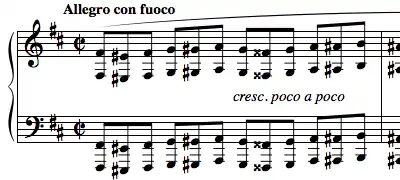Étude Op. 25, No. 10 (Chopin)
Étude Op. 25, No. 10, in B minor is a solo piano study composed by Frédéric Chopin in 1835.

Structure
Étude Op. 25, No. 10 features many unique aspects not typically present in Chopin's études, including a significant and distinctive ternary form. The first theme is presented as a series of eighth note-tuplets in cut time, but not in 12
8 time, played at a very fast tempo of Allegro. The second theme is in B minor's parallel major, B major, and in triple metre. The second theme is repeated four times, and develops into a variation of the first theme, returning to cut time and B minor.
Copious pedal point notes and phrase markings are present in the second theme, but the entire étude lacks any pedal indications. Similar to the Op. 10, No. 4 étude, Chopin emphasizes legato playing through the phrasing and (lack of) pedal marking. Throughout the entire work, Chopin marks only five dynamic markings; the entire first theme is to be played forte to fortissimo, and the whole second theme is piano.[1]
Notes
- Palmer, W: Chopin Etudes for the Piano, page 108. Alfred Publishing Co., Inc., 1992
External links
- Études Op. 25: Scores at the International Music Score Library Project
- Op. 25, No. 10 played by Josef Lhévinne
- Op. 25, No. 10 played by Alfred Cortot
- Op. 25, No. 10 played by Claudio Arrau
- Op. 25, No. 10 played by Vladimir Ashkenazy
- Op. 25, No. 10 played by Maurizio Pollini
- Op. 25, No. 10 played by Andrei Gavrilov